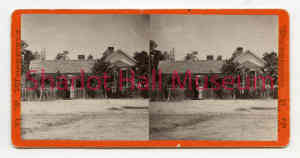Varney Stephens Residence
details
D. F. Mitchell / Prescott, Arizona Territory Unknown bure4090pb.jpg BU-RE-4090 B&W 1407-4090-0002 bure4090pb Stereograph Print 3.5x7.5 Historic Photographs c. 1878 Reproduction requires permission. Digital images property of SHM Library & ArchivesDescription
Varney A. Stephens residence, Granite Street, Prescott, Arizona. Back of photo reads: "Mrs. Stephens (Nancy A. Stephens) at gate."
Varney was one of the earliest pioneers in Prescott, Arizona, arriving in Prescott in 1864 via Texas. He and his wife, Nancy A. Bell, arrived in Prescott from Jacksonville, Missouri in 1864 and remained there their entire lives. They had three daughters and one son. The Stephens family adopted a Native American girl named Joan/Jo Ann in 1865 after a group of soldiers killed 22 Native Americans, of which only the girl was spared.
Initially, Varney started with ranching but moved to other businesses. In 1870 he helped establish the business of Kelly & Stephens with William Needham Kelly, another 1864 pioneer, in Prescott. (William married Varney's daughter Martina). The business was first engaged in freighting, then in stationery and they finally added clothing. The Prescott Fire of 1900 consumed their store and entire stock. Stephens died on September 21, 1904 and Nancy Stephens died in 1908.
Purchase
To purchase this image please click on the NOTIFY US button and we will contact you with details
The process for online purchase of usage rights to this digital image is under development. To order this image, CLICK HERE to send an email request for details. Refer to the ‘Usage Terms & Conditions’ page for specific information. A signed “Permission for Use” contract must be completed and returned. Written permission from Sharlot Hall Museum is required to publish, display, or reproduce in any form whatsoever, including all types of electronic media including, but not limited to online sources, websites, Facebook Twitter, or eBooks. Digital files of images, text, sound or audio/visual recordings, or moving images remain the property of Sharlot Hall Museum, and may not be copied, modified, redistributed, resold nor deposited with another institution. Sharlot Hall Museum reserves the right to refuse reproduction of any of its materials, and to impose such conditions as it may deem appropriate. For certain scenarios, the price for personal usage of the digital content is minimal; CLICK HERE to download the specific form for personal usage. For additional information, contact the Museum Library & Archives at 928-445-3122 ext. 14 or email: orderdesk@sharlot.org.




